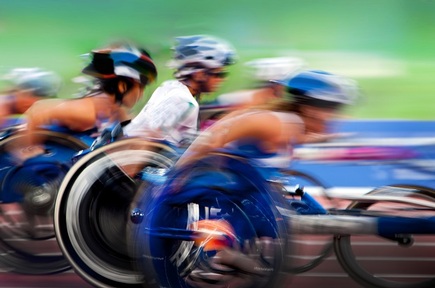Paralympics branded 'unfair' as learning disability athletes excluded from most sports
Athletes with a learning disability are only allowed to compete for four per cent of the gold medal opportunities at the Tokyo Paralympics, sparking criticism that the global sports competition is ‘unfair’.

There have been calls for greater inclusion for athletes with learning disabilities after only 13 Team GB athletes with a learning disability will compete in this year's Paralympics (24 August – 5 September) – out of a total of 209 disabled athletes competing.
Athletes with a learning disability can only compete in three sports – athletics, swimming and table tennis - out of a total of 22. Overall, athletes with a learning disability can compete in only 21 of the 539 events taking place – giving them the chance to win a maximum of 21 gold medals.
ParlympicsGB athletes with a learning disability are competing in just two sports this year.
Learning disability is still so misunderstood’
London 2012 saw the reintroduction of athletes with a learning disability to the Paralympics, following a 12-year ban after the Spanish basketball team were found to have faked having a learning disability in order to compete.
Almost 10 years on from the reintroduction of athletes with a learning disability to the Paralympics, disability charity Mencap says athletes with learning disabilities are being let down as they continue to face exclusion from the majority of sports.
Mencap is calling on the International Paralympic Committee to increase opportunities for athletes with learning disabilities to make the games "truly inclusive". It also wants UK sports organisations to commit to more funding so that more athletes with a learning disability can compete in the Paralympics.
Edel Harris, chief executive of Mencap, said: “Why is it - when we are constantly talking about the need for greater inclusion – that people with a learning disability are still excluded from so much at the Paralympics?
"It’s been 21 years since athletes with a learning disability were banned from competing in the games - something that has left a terrible legacy, long-lasting exclusion, and meant even fewer opportunities for representation of people with a learning disability on a world stage.
“Learning disability is still so misunderstood, and seeing more athletes with a learning disability competing at the Paralympics would help to fight stigma in wider society. It is also deeply unfair on the talented athletes with a learning disability who cannot compete alongside their disabled peers."
Six Paralympic categories
The six disability groups at the Paralympics in which competitors with at least one of the eligible impairments are grouped into are:
- Amputee: Athletes with a partial or total loss of at least one limb.
- Wheelchair: Athletes with spinal cord injuries and other disabilities that require them to compete in a wheelchair.
- Cerebral Palsy: Athletes with non-progressive brain damage, including cerebral palsy, traumatic brain injury, stroke or similar conditions that can affect muscle control, balance and/or co-ordination.
- Intellectual Disability: Athletes with significant impairment in intellectual functioning and associated limitations in adaptive behaviour.
- Visually Impaired: Athletes with visual impairment. This can be partial blindness (enough to be determined legally blind) to total blindness. The athlete and their sighted guides are considered a team and both can win medals.
- Les Autres (Others): Athletes with a physical disability that does not fall strictly under one of the other five categories, such as dwarfism, multiple sclerosis or congenital deformities of the limbs.
'Sports gives me a boost and a sense of belonging'
There are 1.5 million people with a learning disability in the UK. A learning disability is a reduced intellectual ability which can cause problems with everyday tasks – for example shopping, cooking or travelling to new places – which affects someone for their whole life.
People with a learning disability can take longer to learn new things and may need support to develop new skills, understand difficult information and engage with other people. Learning disability is not a mental illness or a learning difficulty.
Mencap supports peoples with a learning disability by looking to change laws, improve services and access to education, employment and leisure facilities.
Abdul Hameed has a learning disability and is a sports co-trainer at Mencap. He gives workshops to sports providers to explain what it’s like to have a learning disability.
Abdul Hameed: “At the moment there aren’t enough opportunities at the Paralympics. It’s absolutely not right. There shouldn’t be any barriers to getting involved in sport if you have a learning disability or not – it’s unfair.
“There is also not enough representation of people with a learning disability in sports generally. For me, sports has helped me to meet people. It gives me a boost and a sense of belonging.
"I think my role helps to change attitudes but there is still a long way to go to include more people with a learning disability in sports, and in the Paralympics.”
click here for more details or to contact Mencap - North London Domiciliary Care Services
Latest News
 29-Jul-24
Dementia Bus gives carehome.co.uk staff insight into life with dementia
29-Jul-24
Dementia Bus gives carehome.co.uk staff insight into life with dementia
 27-Jul-23
UK's top home care agencies in 2023 revealed
27-Jul-23
UK's top home care agencies in 2023 revealed
 30-Nov-22
A quarter of older people keep their falls secret from family
30-Nov-22
A quarter of older people keep their falls secret from family
 29-Nov-22
'Covid-19 has not gone away' say terminally ill
29-Nov-22
'Covid-19 has not gone away' say terminally ill
 28-Nov-22
IT consultant who received poor care opens 'compassionate' home care business
28-Nov-22
IT consultant who received poor care opens 'compassionate' home care business